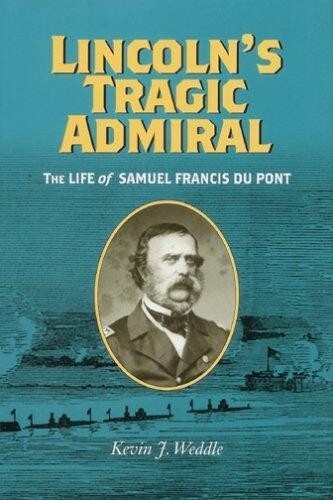Foundation Members receive a 20% discount. Enter the discount code at checkout.
Lincoln's Tragic Admiral: The Life of Samuel Francis Du Pont
$20.00
On Sale
Was $35.00 Save 43%
In stock
Product Details
Once revered as one of the finest officers in the U.S. Navy, Rear Admiral Samuel Francis Du Pont is now, when remembered at all, criticized for resisting technological advancement and for half-heartedly leading the disastrous all-ironclad Union naval attack on Charleston. Although his reputation appeared unshakable after he won the first major Union victory of the Civil War in South Carolina, the failed attack on Charleston brought his career to an abrupt end. Relieved of his command, he was also maligned in the press. In Lincoln’s Tragic Admiral: The Life of Samuel Francis Du Pont, Kevin J. Weddle challenges this reduction of Du Pont’s legacy, combining new and known sources to uncover a thoroughly modern, though flawed, Du Pont.
Despite the fact that Du Pont’s name has become intertwined with the ironclad due to the catastrophic battle that brought shame on both the man and the machine, Weddle reveals that the admiral was the victim of a double irony: although Du Pont championed technological innovation, he outspokenly opposed the use of the new ironclads to attack Charleston. Only when his objections were overridden did his use of these modern vessels bring his career to a tragic end. Weddle exposes this historical misunderstanding, while also pinpointing Du Pont’s crucial role in the development of United States naval strategy, his work in modernizing the navy between the Mexican War and the Civil War, and his push for the navy’s technological transition from wood to iron.
In his examination of key documents from Du Pont’s life and career, Weddle unveils the life-long partnership that Du Pont shared with his wife and confidante, Sophie, who served as an immediate counsel to many of his decisions, while also tackling larger historical questions such as civil-military relations, attitudes toward slavery, innovations in military strategy and organization, and the introduction of new military technology in wartime. Both enlightening and moving, Lincoln’s Tragic Admiral will appeal to scholars interested in American, technological, and military history, as well as the general reader interested in the Civil War.
By Dr. Kevin Weddle - Class of 1999
Save this product for later
Lincoln's Tragic Admiral: The Life of Samuel Francis Du Pont
Powered by Lightspeed
Display prices in:USD

